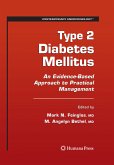Comprehensive and cutting-edge, Type 2 Diabetes: Methods and Protocols offers succinct, proven techniques to aid research scientists and clinicians in continuing the study of this debilitating disease.
Dieser Download kann aus rechtlichen Gründen nur mit Rechnungsadresse in A, B, BG, CY, CZ, D, DK, EW, E, FIN, F, GR, HR, H, IRL, I, LT, L, LR, M, NL, PL, P, R, S, SLO, SK ausgeliefert werden.
"This book provides in 17 chapters laboratory protocols used in diabetes research. It describes methods using new technologies in studying pancreatic beta cells. For research diabetologists." (Pediatric Endocrinology Reviews, Vol. 7 (4), June, 2010)
"Written for those engaged in basic science research who have an interest in expanding their repertoire of techniques for the study of diabetes. ... a credible source of information for those seeking experimental advice. ... an excellent compilation of techniques for the laboratory study of diabetes, particularly those who are interested in studying pancreatic beta cells. Many techniques are covered, with up-to-date and relevant references as well as step-by-step instructions for performing them. The book is a useful addition to any diabetes researcher's bookshelf." (Robert Michael Sargis, Doody's Review Service, July, 2010)









